Books
Books
published in 2022
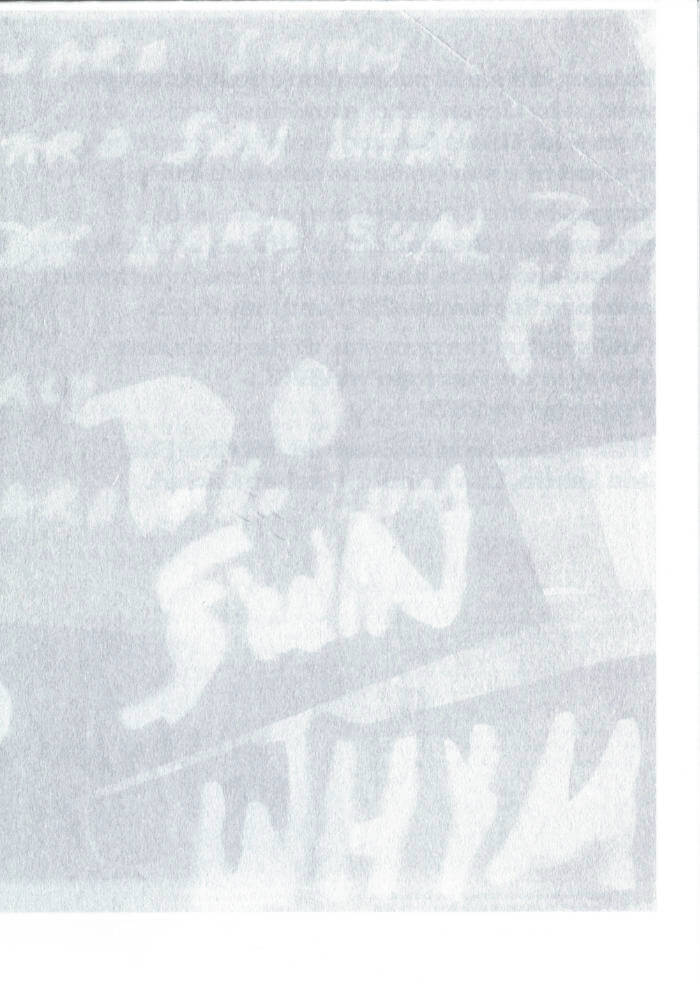
Catalog Issue 20 — 'Hard Sun'
Catalog is a serial publication about cataloging, written by Lieven Lahaye and designed by Ott Metusala. This is Catalog issue 20, ‘Hard Sun’, it’s part of a sub-series on near invisibility. Images in this Catalog were produced by exposure: to the sunlight of Athens, Brussels and Tallinn, and to the heat inside a Berlin apartment, between September 2021 and May 2022. Published on the occasion of the exhibition ‘Penny in the Fountain’ at VBKÖ, Vienna in July 2022.

Catalog Issue 21 — 'Impressed'
Catalog is a serial publication about cataloging written by Lieven Lahaye and designed by Ott Metusala. This is Catalog issue 21, ‘Impressed’, it’s part of a sub-series on near invisibility. Published on the occasion of the exhibition ‘Dear Friend’ at EKA Gallery, Tallinn in September 2022. This issue of Catalog was produced during a residency period at Air Berlin Alexanderplatz, May-August 2022.

La Société n'existe pas: Images de la guerre civile sous Margaret Thatcher
« La société n’existe pas » : la formule de l’ancienne Première ministre britannique Margaret Thatcher est restée célèbre. On connaît moins ses ramifications en images, de la guerre civile anglaise du XVIIe siècle jusqu’à l’art contemporain en passant par la culture populaire en Grande-Bretagne. De photographies en affiches, de manuscrits en frontispices, ce livre traverse l’histoire pour cerner les échos visuels du thatchérisme. Son point de départ est une pièce de l’artiste Jeremy Deller : la reconstitution d’une bataille ouvrière entre mineurs grévistes et policiers survenue en 1984. Maxime Boidy en extrait une série de scènes qui sont autant d’infléchissements de l’idée de « corps politique ». Ce faisant, il dessine la discrète et brûlante actualité de ces formes symboliques, à l’heure de la guerre civile qu’a imposé le thatchérisme globalisé.
Maxime Boidy est enseignant-chercheur en études visuelles. Il s’intéresse principalement à l’histoire des savoirs de l’image et à l’iconographie politique sous toutes ses formes.

L’Architecte et la Femme au foyer
Dans son atelier, qui est aussi son salon, Frances Stark se demande si elle ne serait pas devenue une Femme au foyer. Elle observe avec amusement et lassitude les artistes hommes qu’elle associe à la figure des Architectes parce qu’ils séparent production artistique et activité ménagère, art et décoration et qu’ils ont la chance de pouvoir quitter l’espace domestique pour aller créer ailleurs.
Frances Stark réfléchit à son expérience quotidienne, la mêlant à des réflexions sur des habitations construites par R.M. Schindler et Jorge Pardo, l’essai Critique comme artiste d’Oscar Wilde, le livre Une chambre à soi de Virginia Woolf ainsi que des déclarations de Daniel Buren, d’Adolf Loos, d’Otto Weininger, ou encore de Ludwig Wittgenstein. Elle livre ainsi ses pensées, vives et sagaces, sur les espaces d’exposition, les maisons, les chambres à coucher, les coussins décoratifs, en prenant aussi en compte les couples hommes-femmes qui les utilisent, s’y rencontrent, s’y unissent et s’y séparent.

Un Moyen Âge émancipateur
Clovis Maillet, Thomas Golsenne
Une récente enquête menée dans les écoles d’art et de design francophones aboutit à un constat étonnant : beaucoup d’étudiante·s affirment que l’artisanat est l’avenir de l’art et que les sorcières détruiront le patriarcat. Iels s’approprient un imaginaire composite mêlant fantasy et moines copistes, herboristerie médiévale et communalisme. Dans le même temps, des slogans en latin sont tagués sur les murs par de jeunes révolutionnaires. Des remèdes au capitalisme pourraient-ils se trouver dans le monde qui précéda son avènement ? Pour sonder cet imaginaire politique et artistique construit sur un passé lointain, Clovis Maillet et Thomas Golsenne analysent des œuvres contemporaines, des sources médiévales et la pensée de Silvia Federici et William Morris qui, chacun·e à leur endroit, proposent une vision du Moyen Âge émancipatrice.
Maître de conférences en histoire de l’art et études visuelles à l’Université de Lille, ancien directeur de l’unité de recherche Bricologie à la Villa Arson à Nice, Thomas Golsenne a publié Carlo Crivelli et le matérialisme mystique du Quattrocento (2017).
Professeur·e d’histoire et théorie des arts dans les écoles d’art d’Angers et de Genève, Clovis Maillet est aussi artiste performeur·euse en duo avec Louise Hervé et médiéviste. Iel est l’auteur·ice du livre Les Genres fluides : de Jeanne d'Arc aux saintes trans (2020).

Un énoncé surpris par hasard
Lorsqu’Allen Ginsberg s’enregistre sur un magnétophone et capte fortuitement des émissions de radio, le souffle du vent et des conversations, des agents du FBI et de la CIA l’écoutent, à la recherche d’aveux involontaires. En considérant ces agents comme de sérieux théoriciens de la poésie, Lytle Shaw montre qu’ils s’inspirent des expérimentations d’avant-garde et transforment une technique libératrice en un outil répressif.
Lytle Shaw enseigne la littérature à l’Université de New York. Il a publié Frank O’Hara : The Poetics of Coterie en 2006 (University of Iowa Press) et Fieldworks : From Place to Site in Postwar Poetics en 2013 (University of Alabama). En 2021, est paru New Grounds for Dutch Landscape (OEI).
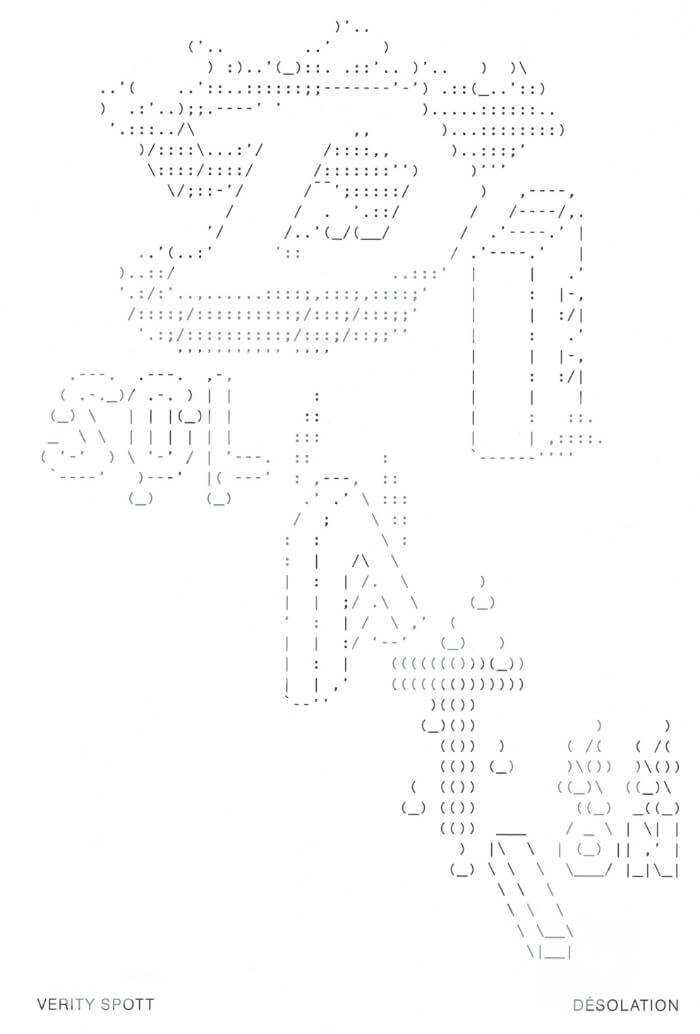
Désolation
Un hôpital où un corps est connecté à un dispositif médical. Un pré faussement idyllique sous lequel grouillent des câbles. Des rivages où des formes oscillent entre ensevelissement et immersion. Dans Désolation, Verity Spott propose une poésie fantasmagorique entre narration, prose et dialogues. L’expression des sentiments bouleverse les attributions des pronoms personnels et les structures syntaxiques. Des identités changeantes prennent à partie les politiques d’austérité et les voix d’extrême droite. Livre de deuil et d’amour qui frôle la satire, Désolation travaille une écriture hybride où s’entrelacent la poésie lyrique, des images tirées de blockbusters et le langage des démagogues pour contrer les moules qui tenteraient de dicter la forme de nos chagrins.
Verity Spott vit à Brighton, écrit de la poésie et fait des performances. Ses derniers livres comprennent Click Away Close Door Say (Contraband Books, 2017) et le recueil de ses Coronelles (Veer Books, 2021).

Le Discours des autres
Craig Owens (1950-1990) a bouleversé la théorie de l’art en une décennie d’intense travail. À la fin des années 1970, aux États-Unis, il s’engage dans l’aventure intellectuelle postmoderne, en quête d’alternatives à un discours moderniste cramponné aux problèmes formels. Owens se penche sur des pratiques artistiques conçues à la croisée des médiums, comme celles de Robert Smithson ou de Trisha Brown. Lecteur des philosophes poststructuralistes, il soutient que les oeuvres se composent de signes ouverts à l’interprétation. Owens place ainsi les spectateur·ices au premier plan, tout en apportant une inscription théorique inédite aux performances de Laurie Anderson et aux oeuvres postconceptuelles de Barbara Kruger, Cindy Sherman, Sherrie Levine ou Martha Rosler. Attentif au genre des artistes et inspiré par des réflexions sur le pouvoir du regard masculin, Owens écrit ensuite sur le féminisme et la domination. Ses essais prennent une tonalité sociale et politique. Ils touchent aussi à des questions ouvertes par les études postcoloniales. Autant de recherches interrompues par le sida, dont Owens meurt en 1990.
Ce recueil, établi, introduit et traduit par Gaëtan Thomas, permet de suivre les expérimentations d’une oeuvre portée par une réflexivité exceptionnelle.
Gaëtan Thomas est historien (médialab Sciences Po, Paris). Il a établi le recueil Pictures: S’approprier la photographie, New York 1979-2014 (Le Point du Jour, 2016) qui rassemble des textes de Douglas Crimp.

Immutable: Designing History
Immutable: Designing History explores the banal genre of the document and its entanglement with statecraft and colonial(ism/ity). This is framed as a ~5,000 year chronology, imbricating the developments of money and writing — from Mesopotamian clay tablets to distributed ledgers, like the blockchain. Immutability figures as a design imperative and hermeneutic for considering a variety of techniques (material, technological, administrative, etc.) of securitization against the entropy of a document's movement through space/time, and the political.
This project is driven by a contrast: design educators tend to teach forms like logos, books, websites, etc., but not passports, money, property deeds, etc., in spite of these being, I contend, design's most profoundly consequential forms.
As an alternative historiography, Immutable gestures both towards anthropologist Laura Nader's call to "study up" (on those in power), and the radical educator Paolo Freire's recognition of the "limit situation" as a generative condition for emancipatory praxis. The book's aim is to orient graphic design towards the vocation of imagining, naming, and remembering beyond the horizons of its role as a managerial, administrative, and colonial instrument that imposes a rationality of vision and accountability upon what is knowable, thinkable and sayable.
Chris Lee is a graphic designer and educator based in Brooklyn, NY. He is a graduate of OCADU and the Sandberg Instituut. His research/studio practice explores graphic design's entanglement with capitalism and colonialism/ity through the banal genre of the document. He is also currently developing a typographical project that narrates the oscillating status of Asians between the "model minority" and "yellow peril" as a function of the consolidation of Euro-American settler identity. Chris is an Assistant Professor in the Undergraduate Communications Design Department at the Pratt Institute.

The Material Kinship Reader
Kris Dittel, Clementine Edwards
What does it mean to acknowledge one’s closeness to, enmeshment in or even kinship with the material world? And what does it mean to question family structures – the way they organise, coerce and make deviant certain lifeforms – and dwell in other possibilities of kin-making?
Not just a jolly rethinking of objects or a polyamorous romp through relationships, The Material Kinship Reader reckons with the extractavist histories of materials and the social relations that frame much of contemporary life.
Spanning fiction and theory, the collection of texts expand the idea of an artist’s book by bringing words into conversation with an aesthetic proposition. Clementine Edwards’ artwork is the visual weft to the book’s written net. From colonial conquest to climate collapse, The Material Kinship Reader tells toxic and tender stories of interdependence among all things sentient and insentient.
Including contributions by Sara Ahmed, Hana Pera Aoake, Roland Barthes, Joannie Baumgärtner, Heather Davis, Kris Dittel, Clementine Edwards, Ama Josephine B. Johnstone, Robin Wall Kimmerer, Ursula K. Le Guin, Sophie Lewis, Steven Millhauser, Jena Myung, Aileen Moreton-Robinson, Michelle Murphy, Ada M. Patterson, Kim TallBear and Michelle Tea

When the Roots Start Moving – First Mouvement – To Navigate Backward – Resonating with Zapatismo
Chto Delat, Free Home University
To Navigate Backward: Resonating with Zapatismo a book-within-a-book, the first of three mouvements (as in a musical composition) is a collection of essays titled When the Roots Start Moving: Chto Delat and Free Home University—investigating predicaments of rootedness and rootlessness and notions of belonging and of displacement across different geographical and epistemological coordinates.
Zapatismo—the insurgent movement of Indigenous peoples from Mexico—emerges as a form of belonging, a home (or a homecoming) for our hopes and political imaginaries, providing a praxis to learn from and with. The contributors of this book, without romanticizing or objectifying the Zapatista struggle toward Autonomy, offer their understanding of the Zapatistas' movement, of their poetics and politics within an Indigenous cosmovision and cosmopolitics, but also in relation with the current global ecological and social crises.
The book extend the research and practice of artistic collective Chto Delat, long since adopting Zapatismo as a lens to self-reflect and emblematically reminding of how the Zapatista imaginary continues to inspire those who are looking for emancipatory tools: through art, language, radical pedagogy and conviviality, as a practice of commoning and collectively reimagining an otherwise.
To Navigate Backward: Resonating with Zapatismo is a small act of reciprocity—in preparation for the Zapatistas' visit to the European continent, a gesture of solidarity with those who, with fierce care, leave their homes to reverse imposed trajectories, to look in the same direction and share a common horizon.
The conversation hosted in this book by Free Home University will continue in the following two mouvements—Between Displacement and Belonging and Motherlands/Mother Earth.
The collective Chto Delat (What is to be done?) was founded in early 2003 in St. Petersburg by a workgroup of artists, critics, philosophers, and writers from St. Petersburg, Moscow, and Nizhny Novgorod with the goal of merging political theory, art, and activism. Chto Delat sees itself as an artistic cell and also as a community organizer for a variety of cultural activities intent on politicizing "knowledge production". The activity of collective takes responsibility for a postsocialist condition and actualization of forgetten and repressed potentiality of Soviet past and often works as a politics of commemoration. From its inception, the collective has been publishing an English-Russian newspaper focused on the urgent issues of Russian cultural politics, in dialogue with the international context. In 2013, Chto Delat initiated an educational platform—School of Engaged Art in Petersburg and also provides resources for a space called Rosa's House of Culture.
Free Home University exists at the crossroad of engaged art, experimental pedagogy, and political commitment since 2014. Based in Lecce (Italy), FHU has been carrying out artistic investigations and processes of convivial research, engaging with communities of struggle and practice. Artists, farmers, activists, asylum seekers, scholars, thinkers and doers collectively inform learning spaces, through living, studying, and creating together.

Unannounced Voices – Curatorial Practice and Changing Institutions
Alternative forms of curatorial and institutional work suitable to our novel conditions, when the relationship between physical and online work must be revised.
In our current era of global pandemic and violent political upheaval, the question must be asked: What is our future and whose voices will announce it? These can only be situated voices, each with its own body and space, formed through dialogue within their own communities and in reaction and resistance to dominant discourses. Museum director, curator, and writer Zdenka Badovinac argues that these situated voices of people, artworks, and exhibitions, rooted in the local, can bring incisive, productive change. The call of these voices, in rethinking art, curation, and institutions, is the subject of this powerful essay.
Zdenka Badovinac is a curator, writer and director of the Museum of Contemporary Art Zagreb. She served as Director of the Moderna galerija in Ljubljana (1993-2020). In her work, Badovinac highlights the difficult processes of redefining history alongside different avant-garde traditions within contemporary art.
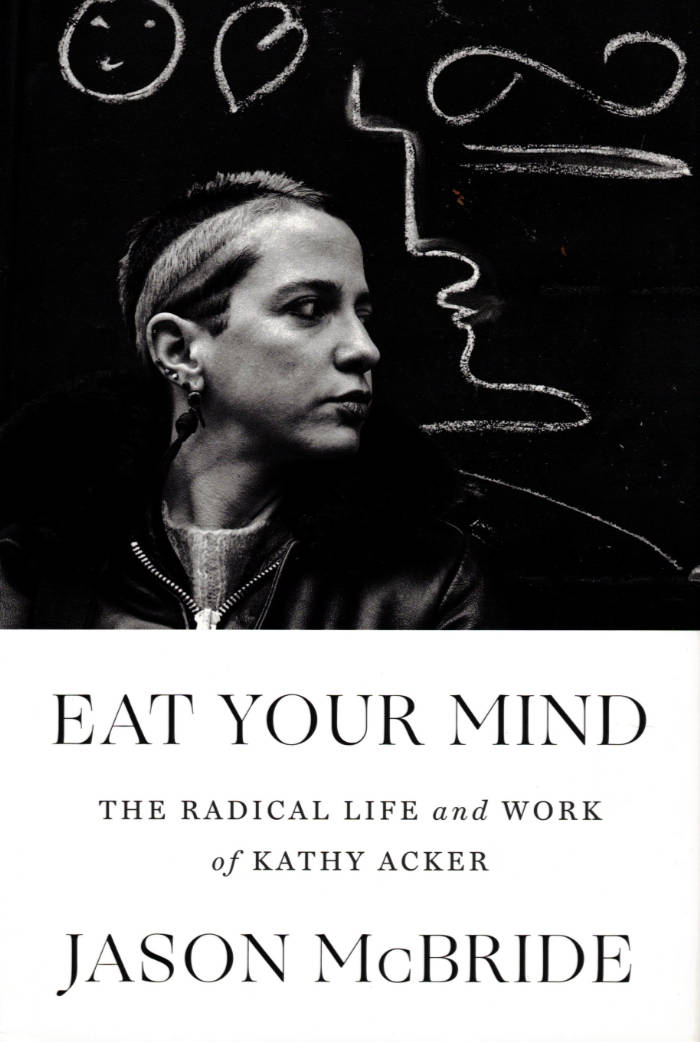
Eat Your Mind: The Radical Life and Work of Kathy Acker
The first full-scale authorized biography of the pioneering experimental novelist Kathy Acker, one of the most original and controversial figures in 20th-century American literature.
Kathy Acker (1947-1997) was a rare and almost inconceivable thing: a celebrity experimental writer. Twenty-five years after her death, she remains one of the most original, shocking, and controversial artists of her era. The author of visionary, transgressive novels like Blood and Guts in High School; Empire of the Senses; and Pussy, King of Pirates, Acker wrote obsessively about the treachery of love, the limitations of language, and the possibility of revolution. She was notorious for her methods-collaging together texts stolen from other writers with her own diaries, sexual fantasies, and blunt political critiques-as well as her appearance. With her punkish hairstyles, tattoos, and couture outfits she looked like no other writer before or after. Her work was exceptionally prescient, taking up complicated conversations about gender, sex, capitalism, and colonialism that continue today.
Acker's life was as unruly and radical as her writing. Raised in a privileged but oppressive Upper East Side Jewish family, she turned her back on that world as soon as she could, seeking a life of romantic and intellectual adventure that led her to, and through, many of the most thrilling avant-garde and countercultural moments in America: the births of conceptual art and experimental music; the poetry wars of the 60s and 70s; the mainstreaming of hardcore porn; No Wave cinema and New Narrative writing; Riot grrls, biker chicks, cyberpunks. As this definitive biography shows, Acker was not just a singular writer, she was also a titanic cultural force who tied together disparate movements in literature, art, music, theatre, and film.
A feat of literary biography, Eat Your Mind is the first full-scale, authorized life of Acker. Drawing on exclusive interviews with hundreds of Acker's intimates as well as her private journals, correspondence, and early drafts of her work, acclaimed journalist and critic Jason McBride offers a thrilling account and a long overdue reassessment of a misunderstood genius and revolutionary artist.

Making Matters: A Vocabulary for Collective Arts
Florian Cramer, Janneke Wesseling
The world today faces overwhelming ecological and social problems and the concern for material existence on earth is more pressing than ever. Making Matters spells out various roles that visual artists and designers play facing these issues. Collective action is necessary and inevitable.
Collective action often changes the artist’s identity and working habits: from individuality and autonomy to collectivity and collaboration, both locally and globally. These developments have given rise to new kinds of collective art and design practices: artists work together with non-artists, make products for their local environment and take on multiple identities, such as researcher, community activist, computer hacker or business consultant.
Making Matters looks at art practices across all continents that do not conform to a Western concept of art nor to traditional distinctions between art, design, research and activism—where the boundaries between art, design, research and activism become blurred or are dissolved.
The entries in this vocabulary experiment with concepts and keywords of current art practices that may no longer be recognizable as art.
Editorial committee: Florian Cramer, Anja Groten, Klaas Kuitenbrouwer, Pia Louwerens, Marie-José Sondeijker, Janneke Wesseling
Contributors: Aliens in Green, a.pass / Lilia Mestre, Florian Cramer, Display Distribute / Elaine W. Ho, Feral Atlas / Lili Carr & Feifei Zhou Anja Groten, Thalia Hoffman, Jatiwangi art Factory / Bunga Siagian & Ismal Muntaha, Eleni Kamma, Frans-Willem Korsten, Klaas Kuitenbrouwer, Pia Louwerens, Dani Ploeger, Kate Rich, Femke Snelting, Olu Taiwo, Janneke Wesseling, West / Baruch Gottlieb, West / Akiem Helmling, Z. Blace
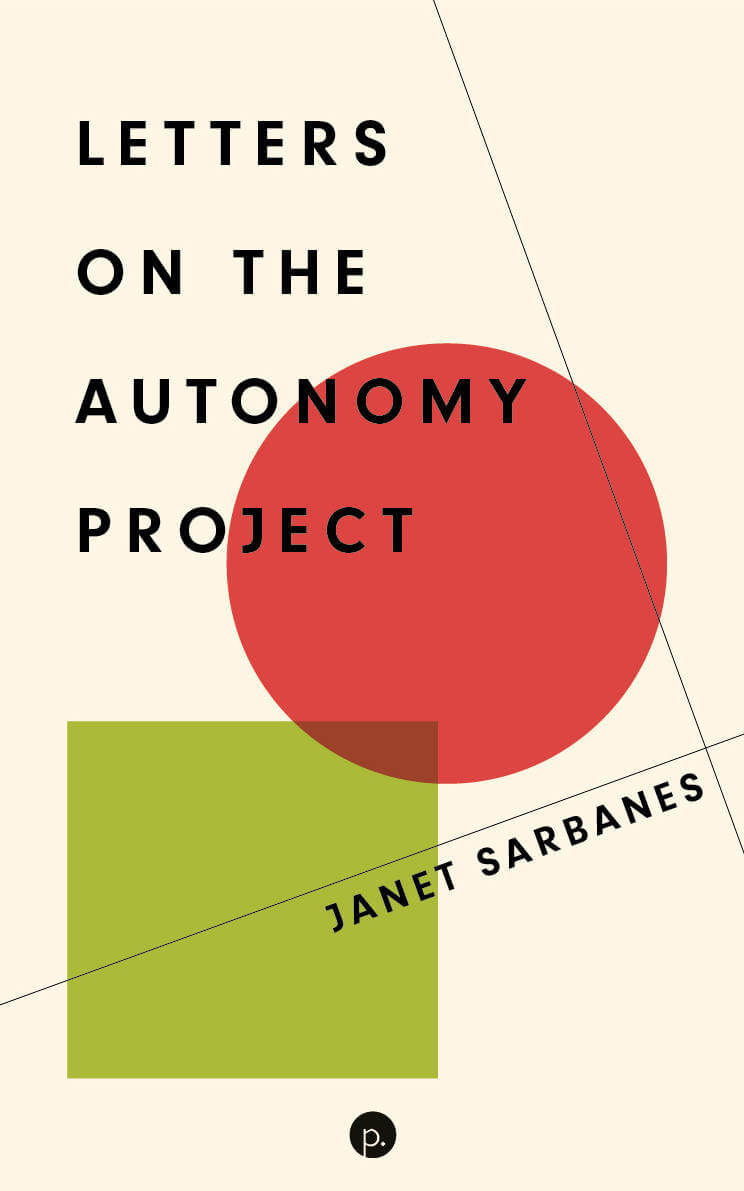
Letters on the Autonomy Project
In the face of rising authoritarianism and on the heels of urgent struggle, autonomy calls to us. How might we excavate the theory and history of autonomous politics to arrive at new possibilities for radical democracy and the radical imaginary? How can we rethink the ways in which artistic autonomy is theorized and practiced beyond the shrunken horizon of liberal individualism? How might we understand political and artistic autonomies as linked, rather than diametrically opposed? And what role does radical pedagogy have to play in all of this?
Framed by the thought of Cornelius Castoriadis, and engaging with Marxist, Black Radical, and Feminist approaches to liberation, as well as movements such as Occupy, Black Lives Matter, Me Too, Letters on the Autonomy Projectunderstands autonomy to be the capacity of a society, a community or an individual to modify its form. As Castoriadis argues, the struggle for self-determination requires unlimited questioning of the way things are, but also that we do or make something new in light of this interrogation. Autonomy is thus equally a project for thought, for education, for politics, and for art.
Stylistically, these open letters, addressed inclusively to artists, activists, and academics, are modeled on the philosophical letters of Friedrich Schiller on the one hand and the revolutionary communiqués of the Zapatistas on the other. Performing a kind of writing-as-praxis, they seek to grasp the potential of our moment with reference to historical and contemporary instances of political autonomy, notions of artistic autonomy, and art practices that connect the two. They also look at the possibilities of educating for autonomy, which cannot itself be taught. If we are indeed living in a time of creative struggle to remake the whole of society, then an understanding of the autonomy project – and how theory, pedagogy, activism, and art might contribute to it – is of burning relevance.
Janet Sarbanes is the author of the short story collections Army of One and The Protester Has Been Released.

Burden of Ashes
The 20th anniversary edition of a groundbreaking Asian-American queer classic by celebrated author Justin Chin.
Floating somewhere between fiction and memoir, Burden of Ashes is a beautiful and brutal series of short stories in which childhood, homeland, and lovers both real and imagined succumb to whimsy, revision, denial, and truthful embellishment. Within these pages, Chin artfully creates a personal world where snake killings, demonic possession, the enigmatic pleasure of a deep kiss, cruelty, and compassion all co-exist. Actual events and fictional outcomes reconcile what has been lost, outgrown, and abandoned with what never was and what might have been.
With foreword by Alexander Chee.
Justin Chin (1969-2015) was born in Malaysia, raised and educated in Singapore, shipped to the U.S. by way of Hawaii, and resided in San Francisco until his passing. Among other accomplishments, he was the author of seven books, including Gutted (2006), winner of the Publishing Triangle's Thom Gunn Award for Poetry.
Alexander Chee is the bestselling author of the novels Edinburgh and The Queen of the Night, and the essay collection How To Write An Autobiographical Novel. A contributing editor at The New Republic, and an editor at large at VQR, his essays and stories have appeared in The New York Times Magazine, T Magazine, The Sewaneee Review, and the 2016 and 2019 Best American Essays. He is a 2021 United States Artists Fellow, a 2021 Guggenheim Fellow in Nonfiction, and the recipient of multiple awards and honors. He is an associate professor of English and Creative Writing at Dartmouth College.

Compost Reader vol. I
Institute for Postnatural Studies
Tongues as long as branches, cockroaches in a ‘hot-history’, the revival of extinct plants, pre-patriarchal paranthropology, thinking with toxic plants in contemporary art, digestive ontologies in a spiral, capitalist bruxism, a business school run by eukaryotes, a society where we pay to eat celebrities, a chumbo, and 800g of bonito tuna fish are some of the matters fermenting in this COMPOST READER.
From Cthulhu Books, we think of the upcoming world as a big Compost. Of composting as a new relational ontology, as our earthly condition. Composting makes us a single planetary material (humans, being, objects, technologies). It is the past and the future. Its space, place, and it’s matter. It is a world as a whole, in which there are no separate natural and social realms, where there are celebratory rituals, entanglements, and interrelationships. Cultivating awareness from questions more than from answers, from uncertainty and doubt.
This book talks about beginnings, new relationships, unstable ways of doing, thinking and being, letting questions breed new questions.
With Claudia González,
Adrian Schindler and Eulàlia Rovira,
Gerard Ortín,
Jonathon Keats,
Marianne Hoffmeister,
Yamil Leonardi,
Ricardo Quesada,
Sonia Fernández Pan,
Azucena Castro,
Mónica Mays,
Michael Wang
and Lucrecia Masson.
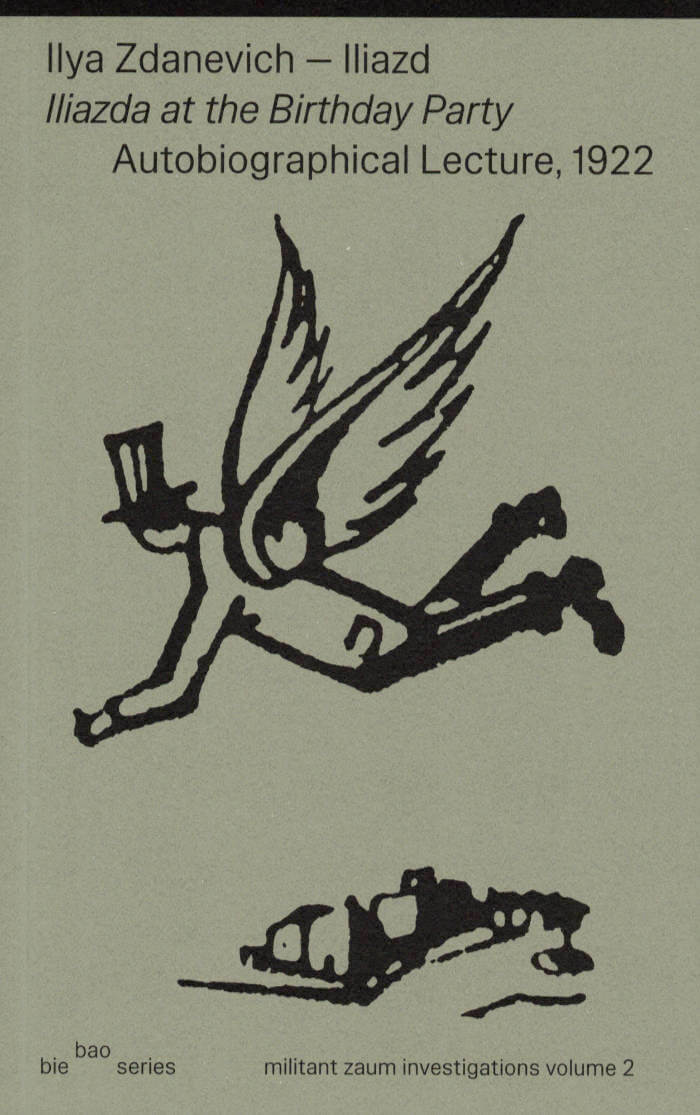
Iliazda at the Birthday Party – Autobiographical Lecture, 1922
The English translation of Zdanevich's Dadaist autobiographical lecture in Paris in 1922, where he adopts the name Iliazda. In this entertaining lecture, the achievements of the avant-garde is presented as a combination of zaum, polymorphous sexuality, aleatory forms and scatological interpretation of culture.
The second volume of the bie bao series presents a eulogy entitled Iliazda at the Birthday Party, a pseudo-autobiographical lecture delivered by Ilya Zdanevich in Paris in 1922. It reports on Zdanevich's artistic and political adventures up until then. Along with an autobiography full of self-admiration, in this lecture Zdanevich gives an interpretation of his zaum dramas inspired by Freudianism, and humorously describes a colourful image of the Russian microcosm in Montparnasse.
Additionally, this second volume also includes Iliazd's letter to Ardengo Soffici from 1964, where one can read, in the most unambiguous terms, about Zdanevich's positions against war, imperialism, and all forms of nationalism. Subtitled 50 Years of Russian Futurism, the letter to Soffici presents us with an altogether new Zdanevich—a "fellow traveller" in both leftist and avant-garde circles. As well as the extended introduction and extensive annotations, the texts are further contextualised with Johanna Drucker's visual presentation of the birth of the Iliazd cult.
The bie bao series will include eight publications, covering many layers of Zdanevich's rich theoretical and artistic output. Each volume consists of a bio-bibliographical introduction, a commentary, a translation with annotations, and artistic intervention.
Iliazd (Ilya Zdanevich, 1894-1975) was a Russian poet, designer, typographer, theoretician, art critic, and publisher, close to the avant-garde circles and one of the promoters of Futurism in Russia, author of a poetic work, drama written in zaum abstract poetic trans-sense or "transrational" language, and novels.
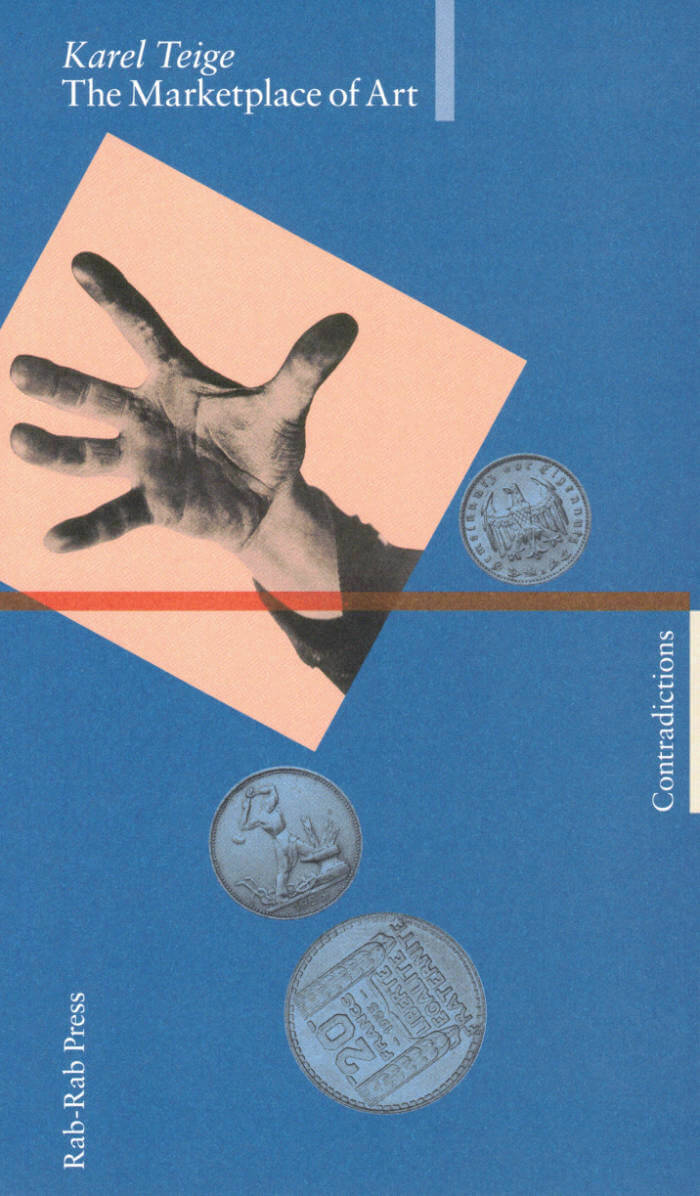
The Marketplace of Art / Commentary
The first English translation of Karel Teige's The Marketplace of Art in two volumes includes a critical introduction, inquiries, and extensive commentaries. Originally published in the Czech language in 1936, The Marketplace of Art is the summation of Teige's artistic, political, and theoretical work.
Acclaimed as one of the leading theoreticians of avant-garde art and architecture between the two world wars, Teige's more political writings still remain to be discovered. Written in 1936, in the context of the rising conservative right-wing culture, and during the intense debates between the avant-garde artists and the Communist Party, The Marketplace of Art is a response to the capitulation of contemporary art to fascist and Stalinist currents. Teige discusses this reaction as something deeply inscribed into the culture of the bourgeoisie, which he claims is a culture "not able to create and inspire any other kind of art besides a hollow and pompous academism or sentimental kitsch." Teige's Marxist analysis of the art market shows in which way this culture is tied with capitalist institutions and he offers artistic and political strategies to oppose its absolutism. In today's warmongering culture of authoritarian neoliberalism where the contemporary art market is run by oligarchs, Karel Teige's radical critique of the art market is more relevant than ever.
Rab-Rab Press presents this long-awaited translation with an accompanying volume of commentaries and interventions. Edited and introduced by Sezgin Boynik and Joseph Grim Feinberg, the book is published in collaboration with Contradictions/Kontradikce Journal based in Prague. The commentary volume includes commissioned essays by Zbyněk Baladrán, Dave Beech, Jana Ndiaye Berankova, Michel Chevalier, Esther Leslie, John Roberts, and Paul Wood, as well as an inquiry on The Marketplace of Art with responses from František Dryje, Tomáš Hříbek, Rea Michalová, Šimon Svěrák, and Roman Telerovský.
Czech artist, critic, and art theorist Karel Teige (1900-1951), close to the French Surrealists, founder of the Devětsil group in 1920, and member of Leva Fronta (The Left Front), was one of the most important figures of the Czech avant-garde.
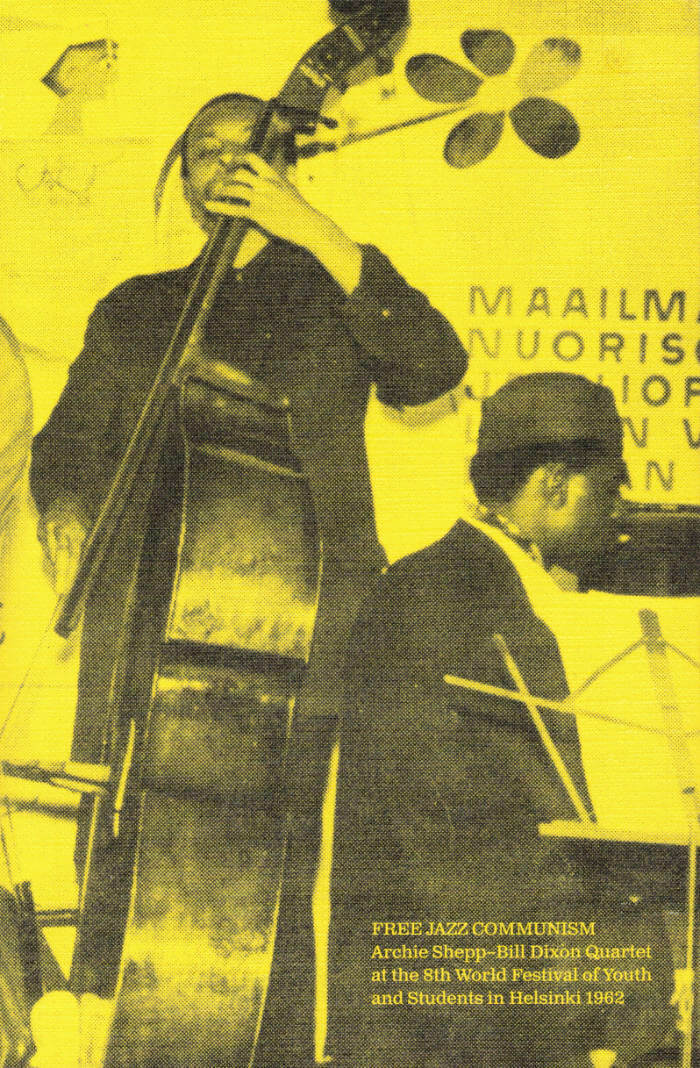
Free Jazz Communism
Sezgin Boynik, Taneli Viitahuhta
Actualising the concert of Archie Shepp–Bill Dixon Quartet at the 8th World Festival of Youth and Students in Helsinki 1962, Free Jazz Communismcontextualizes the politics of free jazz music in light of global decolonisation movements, anti-war activism, structures of racial capitalism, and forms of avant-garde music.
Apart from the theoretical and historical overview by its editors Sezgin Boynik and Taneli Viitahuhta, the book includes testimonies of the collective and international spirit of the 1962 Youth Festival, translated documents from the Finnish press, a new interview with Archie Shepp, commissioned text by Jeff Schwartz on the historical context of political engagement of free jazz musicians, and reproduction of three hard-to-find texts by Shepp. The new edition of Free Jazz Communismalso includes the reprint of the entire script of Archie Shepp's play The Communist (Junebug Graduates Tonight: A Jazz Allegory).

Notes on Evil
An investigation into the current social architectures that determine the perception of the notion of "evil"... and the production of figures that embody it.
What is evil? How is it categorized, understood, and used as a tool? Surveying recent examples of "evil" which have taken hold in mass culture, Notes on Evil examines the mechanisms by which societies construct new enemies in a collective bid to rid themselves of their problems, usually culminating in largely superficial or aestheticized purges. Do societies necessarily need to create evil villains in order to function? And is the villain's role best understood as that of a court jester, who symbolically appears to mock the sovereign, while actually reinforcing their position of power?
Artist and writer Steven Warwick reflects on the overlapping social architectures which frame our current discourse on good and evil, ultimately charting a path beyond our present climate of reductivism, false binaries, and collective impasse.
Steven Warwick is a British artist, musician and writer residing in Berlin. His practice includes durational performance installations, plays and films using the construction of situations and language. He also makes music under his own name, and previously as Heatsick. His writing has appeared in Texte zur Kunst, Frieze, Urbanomic, Artforum, Spike and Electronic Beats and has co-authored a book released on Primary Information.
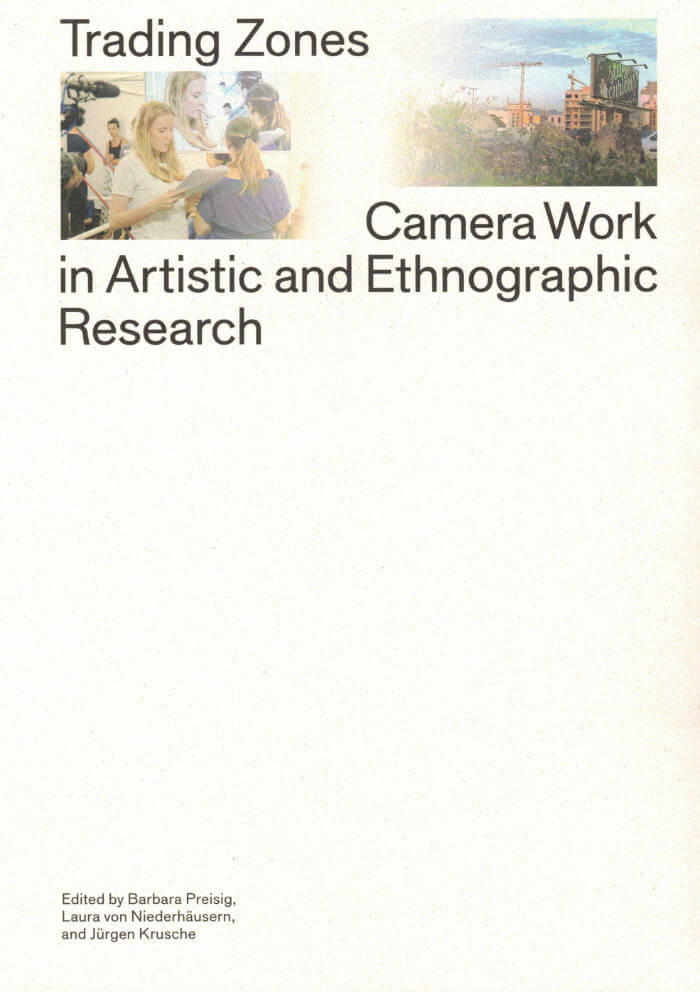
Trading Zones – Camera Work in Artistic and Ethnographic Research
Jürgen Krusche, Laura von Niederhäusern and 1 more
This book introduces camera-based practices at the intersections of artistic and ethnographic research that critically examine the means of their own production and social embeddedness.
In shared practices such as recording in the field, editing in post-production and modes of presentation, the camera is involved as an agent rather than an innocent device. How does the camera grapple with the invisible and how does it reveal what the camerawoman is unable to see? How do films, videos and photographs provide access to vulnerable knowledges and what presentation formats can extend the linearity of narration?
Taking account of their own situatedness and the limits of representation, many of this book's contributors attempt to speak with—rather than about—the other. These negotiations appearing in the featured projects open up a shared field of artistic and ethnographic inquiry, whose potential—for experiments and reflections—is far from exhausted.
Contributions by Sepideh Abtahi, Shirin Barghnavard, Laura Coppens, Louis Henderson, Heidrun Holzfeind, Mina Keshavarz, Daniel Kötter, Jürgen Krusche, Bärbel Küster, Bina Elisabeth Mohn, Laura von Niederhäusern, Uriel Orlow, Barbara Preisig, Rani al Raji, Nahid Rezaei, Anette Rose, Sahar Salahshoori, Christoph Schenker, Amira Solh, Lena Maria Thüring, Zheng Mahler.

How to Die – Inopiné
A transdisciplinary investigation and a choreographic performance, between Umeå and Oslo, about ecological grief, cultural panic, and a feeling of collapse.
How to Die – Inopiné is a performance and a practice. It thinks through, in an embodied manner, the prevailing contemporary moods of ecological grief, cultural panic, and collapse. As a performance in a theater or outdoors, an audience encounters five dancers who are constantly building, unbuilding, and rebuilding. Afterwards, stories are told around a bonfire. As a practice in the studio, school, or street, a group of dancers, artists, writers, and architects meet for a year of residencies between Oslo and Umeå. They host a working process and encounter external informants. The goal is to displace oneself into the unexpected. This publication, two years in the making, engages with the challenges of translating a choreographic process into the space of a book. It both documents the project's development as well as offering the reader-doer different modes of thinking-doing, from somatic practices to proposals for a curriculum. Experiments in writing, mapping, and moving are played with, all engaging with the question, "what is the future of displaced thinking?"
Published following the series of eponymous events held in Umeå, Oslo, Bergen, Trondheim and Reykjavik in 2019-2020.
Contributions by Harald Becharie, Mia Habib, Jassem Hindi, Asher Lev, Marie Kraft Selze, Namik Mačkić, Ingeborg Olerud, Anna Pehrsson, Ashkan Sepahvand, Nina Wollny.

A Something Else Reader
A previously unpublished anthology of classic texts from Something Else Press, assembled in the 1970s by Dick Higgins, with works by John Cage, Al Hansen, Claes Oldenburg and many more.
Conceived by poet, publisher, artist, composer and writer Dick Higgins (1938-98) in the early 1970s to celebrate Something Else Press—the legendary publishing company he founded in 1963 to showcase Fluxus and other experimental artists—this volume, which was never realized in Higgins' lifetime, collects an amazing array of 1960s avant-garde creativity. Something Else Press published some of the most radical art and literature of its time and provided a foundation and template for the artist's book medium, which has flourished internationally since the 1960s.
The Reader features selections from rare and out-of-print Something Else classics such as Claes Oldenburg's Store Days; John Cage's Notations; Emmett Williams' An Anthology of Concrete Poetry; Richard Kostelanetz's Breakthrough Fictioneersanthology; Jackson Mac Low's pioneering poetry collection, Stanzas for Iris Lezak; Gertrude Stein's Matisse Picasso and Gertrude Stein; Bern Porter's I've Left; Wolf Vostell's Dé-coll/age Happenings; Al Hansen's A Primer of Happenings & Time/Space Art; and other pamphlets and artist projects for the page by Robert Filliou, Ian Hamilton Finlay, Alison Knowles, Nam June Paik, Philip Corner, Daniel Spoerri, André Thomkins and Richard Meltzer, among others. A critical checklist/bibliography assembled by Hugh Fox and Higgins' introduction from 1973 completes the original manuscript.